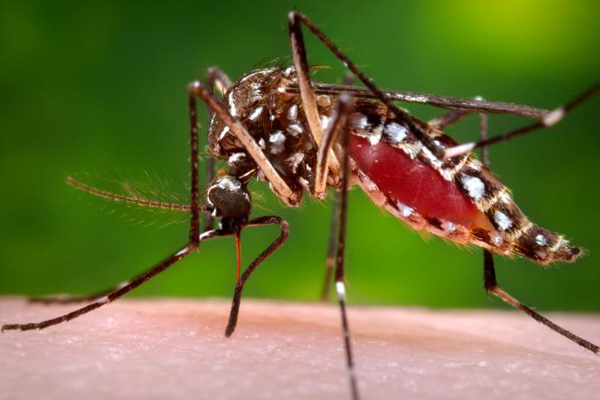
by Kate Evans
The Centers for Disease Control and Prevention is working with three state health departments to investigate nine cases of locally acquired malaria. Seven cases occurred in Sarasota County, Florida, one in Cameron County, Texas, and one case of locally acquired malaria in a Maryland resident who lives in the Washington, D.C. area.
CDC officials said in a press release that no evidence indicates that the cases in the three states are related. All of the patients were promptly treated at area hospitals and are recovering.
Most malaria cases in the United States are due to people traveling to countries where malaria is regularly occurring. However, cases of locally acquired mosquito-transmitted malaria can occur when a mosquito bites a traveler infected with malaria and then bites someone else.
Malaria is a serious disease primarily spread by certain mosquitoes that are infected by malaria parasites. People get malaria by being bitten by an infected mosquito. Malaria isn’t contagious.
Maryland, Texas
The Maryland Department of Health announced the Maryland locally acquired malaria case several days ago. The individual involved didn’t travel recently out of the United States or to other states with recent locally acquired malaria cases, according to their press release.
Maryland health officials said they hadn’t seen a case of malaria in the state that wasn’t related to travel in 40 years.
According to a health advisory from the Texas Department of State Health Services, a Texas resident who had spent time working outdoors was diagnosed with malaria.
The individual hadn’t traveled outside of the country or state.
The risk of locally-acquired malaria is very low in the United States. More than 2,000 malaria cases are reported annually in the United States, according to the CDC.
Symptoms
Symptoms of malaria include fever and flu-like illness, such as fever, shaking chills, sweats, headache, muscle/body aches and tiredness. Nausea, vomiting and diarrhea can also occur. Symptoms usually begin seven to 30 days after infection. If not treated quickly, the infection can rapidly become severe. If you are having these symptoms, see your physician immediately.
If you have traveled to a region where malaria occurs and develop fever, chills, headache, body aches and fatigue, seek medical care immediately and tell your health care provider about traveling.
Health care providers are urged to consider malaria in patients with a fever who have traveled to an area where malaria is endemic as well as in patients having a fever of unknown origin with no travel history.
Can be deadly
If malaria is left untreated, it can be very dangerous and even fatal, but early treatment reduces the chances of complications, said Maryland Deputy Secretary for Public Health Services Dr. Nilesh Kalyanaraman.
“We urge the public to take precautions against mosquito bites, and if you develop symptoms after traveling abroad, seek urgent medical care,” said Dr. Kalyanaraman.
Other mosquito diseases
Mosquitoes can also spread diseases such as the Zika virus, the West Nile virus, the Chikungunya virus, La Crosse (LAC) encephalitis virus, Eastern equine encephalitis virus, St. Louis encephalitis virus and dengue fever. Nearly all mosquito-borne viruses carry the risk of meningitis and/or encephalitis.
Alabama just reported two cases of mosquito-borne Eastern Equine Encephalitis (EEE), with one fatality. According to CDC officials around 11 cases occur annually in the U.S.
Prevent mosquito bites
Prevent mosquito bites by using Environmental Protection Agency (EP A)-registered insect repellents containing DEET, containing DEET, picaridin or oil of lemon eucalyptus as directed. Apply insect repellents after applying sunscreen and not before.
Wear, hats, loose fitted long sleeved shirts and pants. Avoid wearing red and dark colors and using flowery perfumes and scented hair products or aftershave, which attract mosquitoes.
Avoid areas of high mosquito activity during the late evening and at night. Stay indoors at dawn and dusk when mosquitoes are most active.
Stay indoors in air-conditioning when possible and sleep in places with air-conditioning and window and doors screens to keep mosquitoes outside. Repair holes in screens right away. Don’t leave doors propped open.
Children
Center for Disease Control and Prevention (CDC) officials advise that most insect repellents including DEET can be used on children older than two months of age. Oil of lemon eucalyptus should not be used on children under three years old. Mosquito netting can be used to cover children in their cribs, strollers or carriers to protect infants from mosquito bites.
Mosquito control
Drain any standing water outdoors at least once a week to prevent mosquitoes from laying their eggs in it. Tightly cover or dump water-holding containers or remove them.
Clean and chlorinate swimming pools and remove standing water from pool covers.
Rid your property of junk items that can collect water such as old tires, refrigerators and washing machines. Unclog roof gutters.
Natural alternatives
Try natural alternatives like rosemary, basil, lemon balm and catnip that have mosquito-repelling qualities. You can also eat garlic or use garlic oil.
Plant mosquito-deterring flowers and herbs near patios and home entrances. Recommended plants are marigolds, catnip, ageratum, chrysanthemums, citronella, lavender, scented geraniums, basil, rosemary, horsemint, lemon balm, feverfew and pennyroyal.
Keep grassy areas mowed and cut down weeds near your house. Clear obstructions in ditches so water can drain properly.
Put up birdhouses for swallows so they feed on the mosquitoes.
Sources: Centers For Disease Control and Prevention, Mayo Clinic, Mother Earth News, the Pennsylvania Department of Health, the Virginia Department of Health, AccuWeather and Garden Design Magazine websites.



